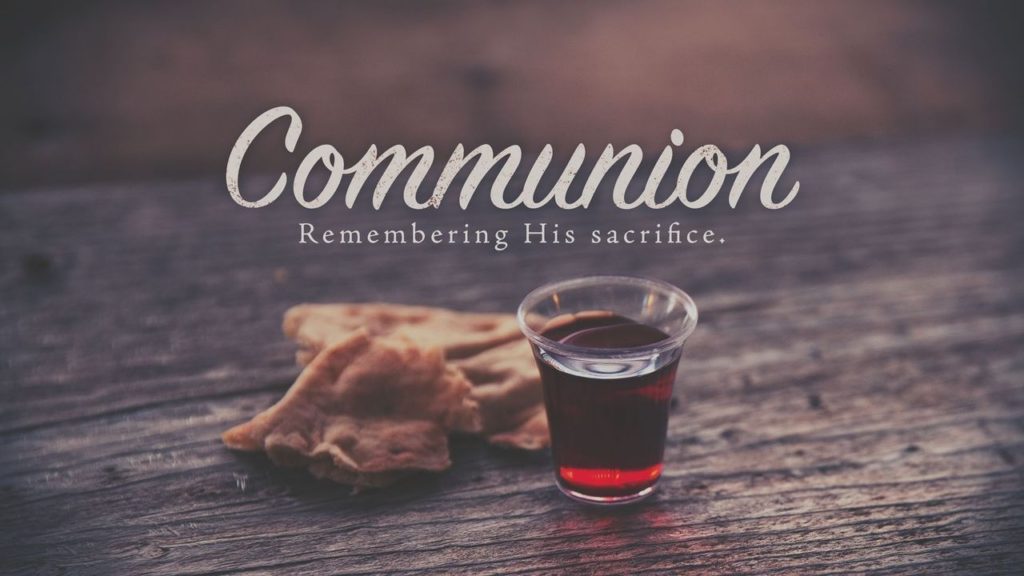
It is that time of year where we will be celebrating the Resurrection of Jesus Christ. A resurrection that occurred because Jesus first came to die in our place, in order that we might live forever with Him. It is His death that has brought about life, it is that death and life we celebrate when we proclaim with remembrance the body and blood of Jesus Christ.
The Lord’s Supper was an important activity in the weekly assemblies of the early believers(Matthew 26:26-28) (Luke 22:17-20) (Acts 2:42) (Acts 20:7). It became the custom that Christians assembled on Sunday, the first day of the week to break bread with one another because of the resurrection of Christ. However, this (what we call the Lord’s Supper or Communion) can turn into an activity that can be easily abused, becoming a meaningless exercise with grave consequences (1 Corinthians 11:17-22, 27). But when properly observed, the Lord’s supper truly is a manifestation of worship. source of wonderful fellowship and great blessing. It can become a key element of “Serving The Lord With Gladness”
Notice, what God’s word says in (1 Corinthians 11:26), now notice the word proclaim. This is the word (kataggello) – {kat-ang-gel-lo} – to declare openly, to declare plainly, to tell out loud. Whenever we share together in the Lord’s Supper we are making a public confession of faith. We are making an open declaration of salvation. A bold announcement that we believe in the death, burial, and resurrection of Jesus Christ. That was a bold testimony for the early church, one that could possibly cost ones life.
The Lord’s supper, by means of symbols for His flesh and blood, preaches Jesus Christ crucified. Jesus Christ, the sin bearer, the substitute, the mediator, the Lamb of God Who takes away the sin of the world (John 1:29). We are proclaiming in a public way our biblical beliefs that…….
- That Christ was substituted for us
- That God was satisfied with Christ’s substitution
- That man can now be justified – because God is satisfied
Let’s address these three truths this morning
- Communion is a proclamation that Jesus is the Perfect Substitute for the sinner – He died in our place
As a substitute He bore our sins (1 Peter 2:24-25) (Hebrews 9:28). As a substitute He carried our guilt (Isaiah 53:4, 5, 8, 12) (Galatians 3:13) As a substitute He died our death (Hebrews 2:9) As a substitute He became the sin-offering for us. Read: (2 Corinthians 5:21) (1 Corinthians 1:26-31)
So it is preached from the Lord’s table that Jesus became a curse in our place. He bore the wrath of God’s judgment and the necessary penalty of our rebellion in His own body. His innocent life was given, His flesh was torn like a veil, and His righteous blood was poured out on God’s alter, all so that you and I who are guilty might live forever
- Communion is a proclamation that God is satisfied with Christ’s substitution
- We call this propitiation – which refers to the work of God in setting His Son as the satisfactory ransom to settle justly His wrath against sin-offering
- Our sin – is an offense – is an insult – and is rebellion – against God’s character
- It is a strike – without limits against His holiness – which has produced a necessary wrath
- His holy wrath must be infinitely satisfied before God’s love can be expressed justly
- Man’s dilemma is that he is guilty before God’s law and doomed to pay an eternal debt
- His only hope is that God would show him mercy
We call this propitiation, which refers to the work of God in setting His Son as the satisfactory ransom to settle His wrath against sin-offering. Our sin is an offense, an insult, and is rebellion against God’s character. It is a strike, without limits against His holiness which has produced His necessary wrath. In His own flesh and blood, Jesus bore the full penalty of Divine wrath. Now, by His death, God remains righteous and yet is able to pardon the sinner who believes God (1 Peter 1:18-21) (2 Corinthians 5:17-19) (1John 4:10). Amazing!
- Communion is a proclamation that man can now be declared righteous by faith – because God is satisfied with Christ’s substitution
The word for this is justification is – (dikaioo) {dik-ah-yo-o} – it means just, innocent, acquitted, free, or cleared from any charge (Acts 13:39) (Romans 5:17-21) (Romans 5:8-11) (Romans 3:23-26) (Hebrews 10:1-18).
We eat the bread in memory of His body given for us (Mark 14:22). We drink the cup (fruit of the vine) in memory of His blood shed for us (Mark 14:23-24). We therefore remember the death of Jesus on the cross who makes the new covenant possible. As the Passover was a memorial commemorating Israel’s deliverance from Egypt through the blood of the lambs on the door post, so the Lord’s Supper is a memorial of our Lord’s death who makes our deliverance from the bondage of sin possible.
The Lord’s Supper should be observed in a worthy manner (1 Corinthians 11:27-33), and yet some have misunderstood the word worthy here in this verse. It’s describing how we take it not whether we are worthy. None are truly worthy in themselves, right? The Lord’s Supper should be observed with respect for the supreme price Jesus paid for our sins. To make light of this memorial is to have the attitude of those who mocked Him as He hung on the cross. It is to be taken with other Christians (“wait for one another”) – we share in the body and blood of Christ together – (1 Corinthians 11:33).
